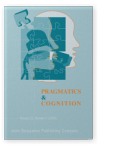Vol. 22:3 (2014) ► pp.352–372
Searle vs. Searle on language, speech, and thought
Searle’s (1963/1991) account of the communicative intentions in speech acts purports to be an advance over that of Grice (1957), in acknowledging the ineliminable role of the linguistic (usage) rules in enabling the hearer to recognize the speaker’s communicative intentions. In this paper we argue that, given some plausible assumptions about ordinary speech exchanges, Searle’s insight on this score is incompatible with his (1983) commitment to internalism in the philosophy of mind. As a result, Searle cannot have it both ways: either he must give up his core insight regarding the ineliminable role of linguistic (usage) rules in the hearer’s recognition of a speaker’s communicative intentions, or he must give up his commitment to internalism the philosophy of mind. We conclude by arguing that this lesson is generic: the forced choice is one that all theorists must face, insofar as we theorize about the role of language in the communication of thought through speech.
